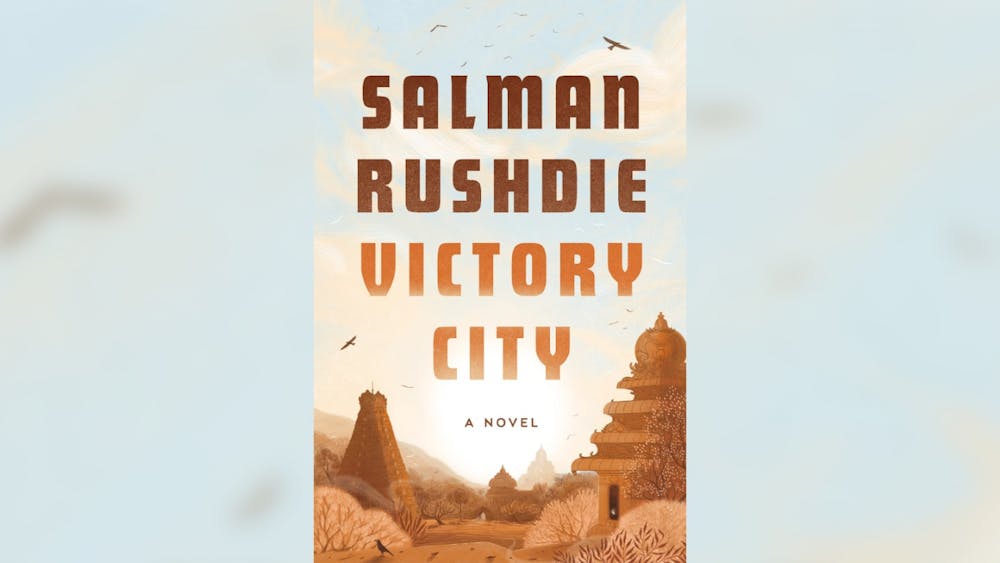Review: Rushdie’s latest novel is a victorious return

Rating: ★★★★★
As epic as the genre of poetry it is imitating, Salman Rushdie’s “Victory City” is an exquisite novel. Reading like a rom-com, a heroic adventure tale and a political thriller at the same time,s it is a powerful return for Rushdie – the first book he has published since he was brutally attacked in August 2022 at an event in New York. “Victory City” is Rushdie’s thirteenth book, and was released 42 years after he published “Midnight’s Children,” which won the Booker Prize and was also named the “best novel of all winners” twice.
Poignant social criticisms sit behind a fairytale-esque story about magic, romance and palace intrigue in “Victory City.” The novel’s opening tells the reader its exact premise: a narrative poem written by a prophetess about Bisnaga, a city she created, downfall. Despite this immediate summary, Rushdie’s work commands the interest of his reader, and I was enthralled as I read how this fourteenth-century fantasy fell apart. The novel was devourable, not just because of its refreshing plot, but also because it still felt very familiar. Tales of power, messy relationships and conceited friendships will be very resonant to contemporary readers.
While the novel itself is not written in verse, Rushdie manages to capture the richness that typically characterizes poetry in his prose. His long sentences at first seemed intimidating, yet they are consistently beautifully punctuated. Commas and semicolons give the prose a rhythmic quality. Further, scattered across the novel are italicized paragraphs — interludes from the narrator of the novel — where they explain the poem and address us directly. Coupled with his writing, these sections made me feel completely immersed like I was actually reading a Sanskrit epic.
The novel is inspired by Vijayanagar, a real medieval city in modern-day south India which serves as the backdrop to a story about womanhood, religion and power. Rushdie imagines a feminist kingdom, founded by our protagonist, Pampa Kampana, who is a prophetess. She wrote the poem recounting the rise and fall of her kingdom before burying it, only to be rediscovered centuries later. The power of storytelling extends beyond the novel’s conceptual framing, and readers learn quickly that words and stories can be more important than real events.
Kampana’s namesake, the Goddess Pampa, intervenes in Kampana’s life when she was very young, just after her mother killed herself — a victim of her society’s misogyny. The goddess tasks Kampana with creating a feminist paradise and Victory City is born. She is given the power to whisper or storytell things into being, from pustules on the face of a man who was insulting her to individual personal histories for the hundreds of thousands of people she brings into existence on desolate land.
While Greek and Latin mythology still dominate ‘western’ fiction today, I hope that “Victory City” helps to break that hegemony. With “Victory City,” Rushdie demonstrates that he is still relevant today over 40 years since his first work. The novel is a testament to the power of storytelling, the importance of tolerance and the impermanence of power, no matter how hard men try to hold it.
More from The Rice Thresher

Acting like an athlete: Rice basketball alum takes on Broadway
Underneath Chadd Alexander’s Broadway costume, there’s ankle tape and wrist braces — same protective gear he wore as a walk-on basketball player at Rice, though now he’s performing eight shows a week in the ensemble of “Harry Potter and the Cursed Child” instead of running conditioning drills in Tudor Fieldhouse.
“Love Island” Season 7: A Messy, Magnetic Reality Show
It was my first time watching “Love Island,” and I get it now. There's a cycle to this show: you swear you won't get sucked in, you dismiss it as background noise, and then, one week later, you're canceling plans just to hear a group of twenty-somethings debate the meaning of the word "exploring." The truth is, “Love Island” has plenty of flaws. It’s too long, too produced and too ridiculous, but I'll be the first to admit it: I'm already planning to watch next season.
Review: “F1: The Movie” puts pedal to the metal
Joseph Kosinski, Claudio Miranda and Jerry Bruckheimer — the trio behind “Top Gun: Maverick” — return to high-octane spectacle with “F1,” a sports drama that blends spectacle with surprising humanity. It’s loud, stylish and frequently overwhelming, but it’s also one of the most engaging racing movies in years.


Please note All comments are eligible for publication by The Rice Thresher.